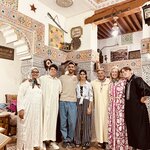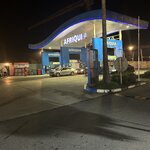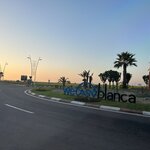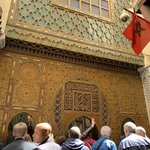
Imperial Cities of Morocco - 7 Days

Highlights
- Roam the picturesque blue alleys of Chefchaouen's medina
- Discover Volubilis, the furthest point of the Roman empire into Africa
- Wander the medieval maze-like streets of Medieval Fes
- Make like Ingrid Bergman and Humphrey Bogart and share a drink in Casablanca
- Watch acrobats and snake charmers entertain in Marrakesh's Jemaa el-Fna Square
Brief Itinerary
| Day | Highlights | Overnight |
|---|---|---|
| Day 1 | Arrive in Tangier, Transfer to Chefchaouen | Chefchaouen |
| Day 2 | Transfer to Fes via Volubilis & Meknes | Fes |
| Day 3 | Explore the Medieval Medina of Fes | Fes |
| Day 4 | Transfer to Casablance via Rabat | Casablanca |
| Day 5 | Hassan II Mosque Visit, Transfer to Marrakesh | Marrakesh |
| Day 6 | Marrakesh: Exploring the Red City | Marrakesh |
| Day 7 | Depart Marrakesh |
Detailed Itinerary
Day 1: Arrive in Tangier, Transfer to Chefchaouen

Welcome to Morocco! Arrive in the port city, and the gateway between Africa and Europe, of Tangier. You'll have the option to either spend time exploring Tangier or continue on to the striking blue city of Chefchaouen in the Rif Mountains. Just before you reach Chefchaouen, stop to hike (two to three hours) through lush vegetation and small pools to enjoy the Cascades d'Akchour (Waterfalls of Akchour)—a tucked away gem. From there, arrive in charming Chefchaouen. Known for its blue-washed buildings in its historic medina, explore its maze-like narrow streets and alleyways, which cling to the northern hillside.
Discover Place Outa el Hammam, the main square named for the number of hammams (public baths) that used to encircle it. Find a restaurant or café for a bite to eat before browsing the many shops offering traditional wares. Visit the Grand Mosque and kasbah (old fortress or fortification). The Mosque was built in 1560 and cannot be entered by non-Muslims (but the view from the outside is still worth a visit). Explore the kasbah and tour a garden, a museum, and even some of its old prison cells.
As the evening approaches, follow the streets east and ascend the path leading to the white Spanish Mosque (20 to 30 minutes). Enjoy one last view over Chefchaouen as the sun sets behind the mountains.
Day 2: Transfer to Fes via Volubilis & Meknes
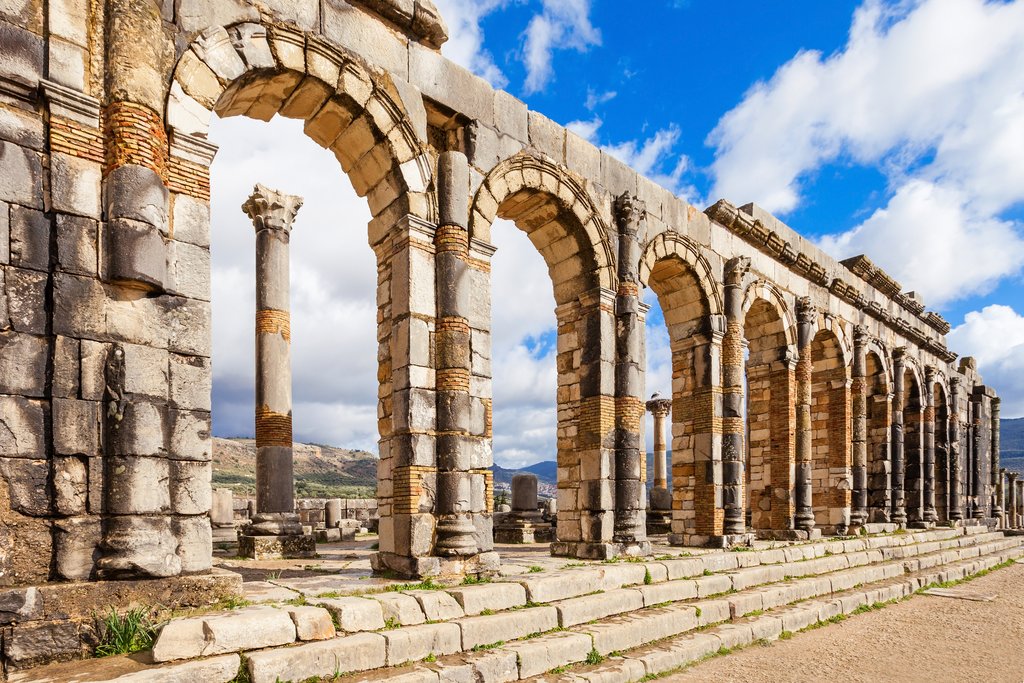
Rise early to wander the quiet streets for your best chance to snap unobstructed photos before leaving Chefchaouen behind. Make your way toward Fes, taking a short detour to explore the impressive Roman ruins at Volubilis. A UNESCO World Heritage Site, Volubilis is a sprawling complex worth wandering. Founded in the third century BCE, it was abandoned in the 11th century and remains incredibly well-preserved. Marvel at the merchant homes and their visible heating systems underneath, the temples, and the nearly intact colorful mosaics in situ, including the Labors of Hercules.
Stop in Meknes on your way to Fes. A smaller version of Fes, Meknes offers a calmer medina, and shopkeepers are not as pushy to make a sale. While Meknes is quite large, the two main areas of interest are the Ville Impériale (imperial city) and the manageable medina.
Continue on to Fes and navigate its impressively large and complicated medina that stretches down the hill. Before venturing into the medina, take a moment and visit the ruins of the Merenid Tombs and enjoy a panoramic view of the old city. Stay overnight in a beautiful riad in the medina (with an interior courtyard garden).
Day 3: Explore the Medieval Medina of Fes

Fes is the oldest of the imperial cities in Morocco (Meknes, Marrakesh, and Rabat are the others). Its medina is listed as a UNESCO World Heritage Site, and as one of the world's largest urban car-free areas, it's certainly worth every minute of exploring. Often considered the country's cultural capital, it's made up of two old medina quarters, Fes el Bali and Fes el Jdid, and the modern Ville Nouvelle, constructed during the French colonial era (1912-1956). Meet your guide and spend a half day learning about the history and culture as you navigate the winding, narrow streets of the medinas.
Roam Fes el Bali (founded in 789 ACE) and discover how Spanish and Tunisian refugees influenced the medina's architecture. Browse the many souks (markets) offering local goods and watch the artisans at work. Visit the Chouara Tannery (11th century) and find a nearby leather shop for an encompassing view of the many round stone wells filled with dye and people at work. Visit the Al-Qarawiyyin Mosque (859 ACE) and catch a glimpse of the beautifully decorated interior (non-muslims cannot enter), Its university is the oldest still operating university in the world! Immerse yourself in the Al Attarine Madrasa and marvel at the exquisitely detailed tile and woodwork. Head to Fes el Jdid (13th century) to check out the Mellah (old Jewish quarter and cemetery) and take advantage of its location for a panoramic photo of the city.
Chat with a local specialist who can help organize your trip.
Day 4: Transfer to Casablanca via Rabat

It's time to head west to the capital city of Rabat, located on the Atlantic coast and the Bou Regreg River. Explore the Chellah Necropolis, a medieval fortified city at the heart of Rabat. Wander the enchanting grounds, a mix of Roman and Islamic ruins. Enter through the grand door of the Kasbah des Oudaias and step into the original site of Rabat. Mostly a residential area today, wander the peaceful white and blue-washed streets and chat with locals. Visit the Andalusian Gardens. Built in the 20th century by the French, the gardens offer a serene space away from the crowds. Discover the Hassan Tower, a minaret of the incomplete mosque and Mausoleum of Mohamed V. A project that was abandoned in the 12th century. Now, all that remains is the red sandstone tower standing at 145 feet (44 m) and some 200 columns - support structures for the imagined mosque. Finish the day in Casablanca and settle into your accommodation.
Day 5: Hassan II Mosque Visit, Transfer to Marrakesh

If you only visit one place in Casablanca—the commercial capital of Morocco—make it the Hassan II Mosque. Sitting in a picturesque location on the sea, its 690-foot (210 m) minaret is the tallest structure in Morocco and the tallest minaret in the world. While the exterior and surrounding area are impressive, what makes this mosque even more distinctive is it's one of the few mosques in the country where non-Muslims are permitted to enter. Join a morning tour of the mosque and marvel at the fine artisanship: hand-carved stone and wood, intricate marble floor detailing, and gilded ceilings.
Afterward, peruse the shops of the Hobous medina. Built in the 1930s by the French, it's an excellent area to get a taste of Art Deco architecture while seeking out the olive, vegetable, and spice markets. From there, take a leisurely stroll along the Boulevard de la Corniche, the beach promenade that follows the Atlantic coast and is sometimes referred to as Morocco's Miami. Movie lovers may wish to check out Rick's Café, a restaurant, bar, and café designed to recreate the bar made famous in the movie classic Casablanca. Leave the coast behind and head south (three hours) to the Red City of Marrakesh.
Day 6: Marrakesh: Exploring the Red City
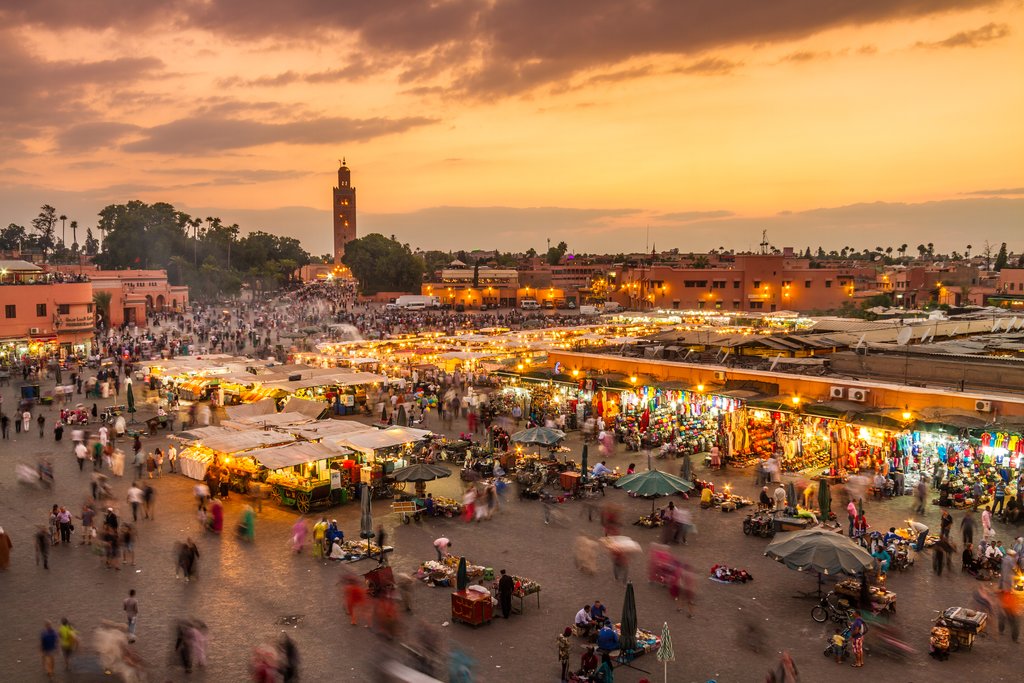
Unlike Fes, Marrakesh has Berber rather than Arab roots and history and was once an important trading capital for tribes of the Atlas mountains and today remains a major economic center. Orient yourself around the Jemaa el-Fna Square: the souks are to the north, the Koutoubia Mosque and Gardens to the west, and the Kasbah area with the Saadian Tombs, Bahia Palace, and El Badi Palace are to the south. In the Ville Nouvelle, you'll find the Majorelle Gardens. Meet your guide and start exploring lively Marrakesh!
Spend time browsing the stalls in Souk el-Attarin (Spices), Souk Haddadine (blacksmiths), and Souk Smata (slippers). As you wander, notice the large open spaces and courtyards. These Fondouks or Caravanserai were once inns used by visiting traders and merchants who slept on the upper floors while their animals stayed on the ground floor. End your afternoon in the Jemaa el-Fna Square in time for when it comes alive with musicians and storytellers, acrobats and dancers, and even snake charmers. As the sun sets, many rows of food stalls will begin to appear, serving anything from full meals to fruit drinks and dried dates. For a more relaxed experience, have a bite and a glass of fresh mint tea in one of the many cafés that sit above the square and enjoy the spectacle below.
Day 7: Depart Marrakech

Complete any last-minute shopping, or you may wish to spend additional time exploring Marrakesh's sites, such as the ornate Bahia Palace (Bahia translates to 'brilliance'). The Palace, built in the 19th century, is showcasing Islamic and Moroccan architecture and artisanship at its finest. It covers eight hectares (10,000 square m) of ground and includes a garden with rooms opening onto courtyards. A visit to the palace and its gardens offers the perfect place for quiet contemplation before catching your flight home.
More Great Morocco Itineraries
Looking for more inspiration for your trip to Morocco? Check out these other Morocco itineraries, explore different ways to spend one week in Morocco, or discover the best time to visit Morocco.



